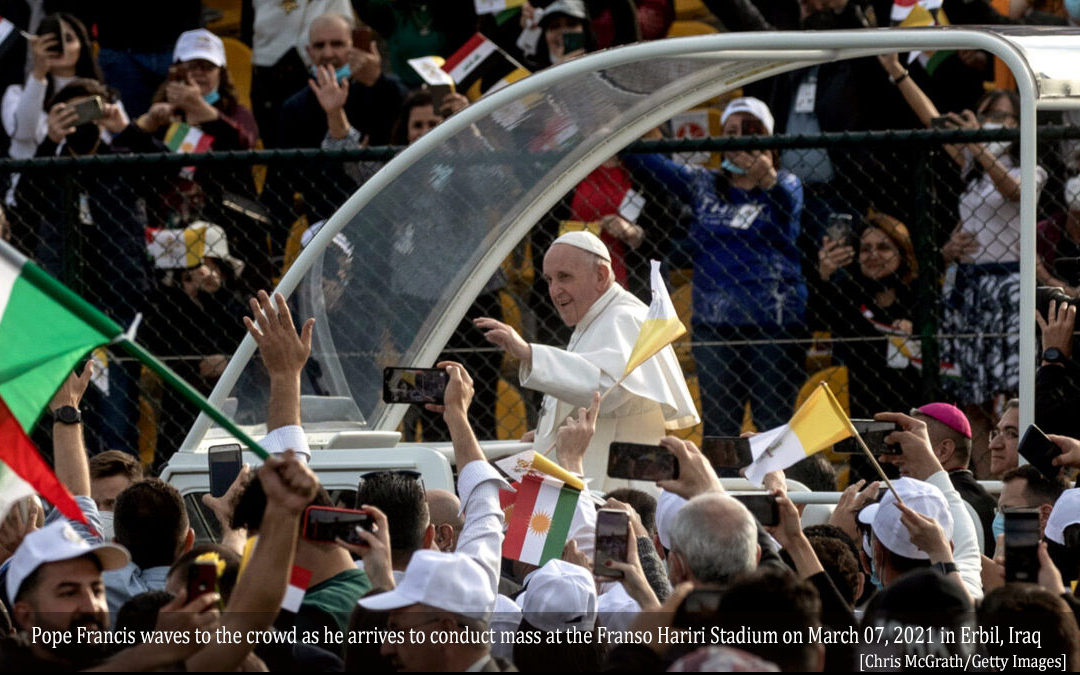Dear Friends,
Pope Francis’ extraordinary visit to war-weary Iraq moved me to tears a number of times. He went to bring comfort and support to the remaining Christians who had suffered so terribly under the ISIS regime. He clearly was acting as a good shepherd who would risk his own life for the sake of every member of his flock. I think the other part of his mission was to show the insanity and evil of violent conflict between religions.
The picture that spoke louder than words was the Pope holding hands with Grand Ayatollah Ali al-Sistani, the Shia cleric who has been critical of the war-mongering of the leadership in Iran. The Pope had to work hard to arrange that meeting. He did not demand that Sistani meet him in some neutral ground, but went to Sistani’s home to have the conversation. Hopefully, the Ayatollah’s statements about the rights of Iraqi Christians will help bring about some peace for our brothers and sisters who have suffered so much simply because they have chosen to follow Jesus.
The Pope also visited some ancient sites of great importance. One of them is Ur, the land of Abraham. While there, he said, “Today we, Jews, Christians and Muslims, together with our brothers and sisters of other religions, honor our father Abraham by doing as he did: we look up to heaven and we journey on earth.
We look up to heaven. Thousands of years later, as we look up to the same sky, those same stars appear. They illumine the darkest nights because they shine together. Heaven thus imparts a message of unity: the Almighty above invites us never to separate ourselves from our neighbors. The otherness of God points us towards others, towards our brothers and sisters. Yet if we want to preserve fraternity, we must not lose sight of heaven. May we – the descendants of Abraham and the representatives of different religions – sense that, above all, we have this role: to help our brothers and sisters to raise their eyes and prayers to heaven. We all need this because we are not self-sufficient. Man is not omnipotent; we cannot make it on our own. If we exclude God, we end up worshiping the things of this earth. Worldly goods, which lead so many people to be unconcerned with God and others, are not the reason why we journey on earth. We raise our eyes to heaven in order to raise ourselves from the depths of our vanity; we serve God in order to be set free from enslavement to our egos, because God urges us to love. This is true religiosity: to worship God and to love our neighbor. In today’s world, which often forgets or presents distorted images of the Most High, believers are called to bear witness to his goodness, to show his paternity through our fraternity.
From this place, where faith was born, from the land of our father Abraham, let us affirm that God is merciful and that the greatest blasphemy is to profane his name by hating our brothers and sisters. Hostility, extremism and violence are not born of a religious heart: they are betrayals of religion. We believers cannot be silent when terrorism abuses religion; indeed, we are called unambiguously to dispel all misunderstandings. Let us not allow the light of heaven to be overshadowed by the clouds of hatred!”
At a prayer service on Sunday before Pope Francis left Iraq, he prayed:
“If God is the God of life – for so he is – then it is wrong for us to kill our brothers and sisters in his Name.
If God is the God of peace – for so he is – then it is wrong for us to wage war in his Name.
If God is the God of love – for so he is – then it is wrong for us to hate our brothers and sisters.
Let us now join in praying for all the victims of war. May Almighty God grant them eternal life and unending peace, and welcome them into his fatherly embrace. Let us pray too for ourselves. May all of us – whatever our religious tradition – live in harmony and peace, conscious that in the eyes of God, we are all brothers and sisters.”
Peace,
Fr. Damian



